Chicago Area Schweitzer Program
For more information contact:
Karol Dean, Program Director, Chicago Area Schweitzer Fellowship, kdean@hmprg.org
Applications are currently closed for the 2025-26 Schweitzer Fellowship Program and will reopen in the fall. For more information, see “Application Process” at the bottom of this page.
Overview
Founded in 1996, Health & Medicine’s Chicago Area Schweitzer Fellows Program cultivates aspiring health and human services professionals to be informed, concerned, and involved with addressing health inequities. Each year, the Schweitzer Program provides 26 exceptional students with opportunities to design and implement projects to improve the health and well-being of underserved Chicago communities. Fellows’ projects often address the social determinants of health, and their activities frequently include tutoring, violence prevention, health education, healthy lifestyle promotion, and outreach to vulnerable and marginalized groups. Our Fellows for Life alumni program supports our graduates’ further development as leaders in service and provides them with continuing networking, skill-building, and community service opportunities.
The Schweitzer Fellowship has the power to open the eyes of future healthcare professionals concerning the larger issues that have developed in terms of healthcare inequity. If there are more professionals that have this insight, then there is more possibility for change and movement in the right direction.
—Samantha Maurer, 2022–23 Fellow
- Since 1996, over 800 Chicago Schweitzer Fellows have completed more than 150,000 hours of community service at more than 150 community-based sites.
- In 2023-24 Fellows provided over 5,600 hours of service to over 3500 unique community members from diverse backgrounds, including people living with homelessness, undocumented immigrants, and LGBTQ+ populations.
The Albert Schweitzer Fellowship (ASF) was founded in 1940 to support the Schweitzer Hospital in Lambaréné, Gabon, West Africa. That work continues now, eighty-two years later, sustaining the Hospital and training health professionals from across the globe. ASF has grown through a network of Fellowship programs across the US, immersing a diverse group of health profession students in an intensive mentored experiential learning and leadership development program designed to increase their skills and commitment to more effectively address the health needs of underserved people.
For over 30 years, the U.S. Albert Schweitzer Fellowship has prepared the next generation of professionals who will serve and empower vulnerable people to live healthier lives and create healthier communities.
The first U.S. Fellowship began in Boston in 1991. Today, the U.S. program consists of 10 chapters, which are in Alabama, Chicago, Columbus-Athens, Detroit, Houston-Galveston, New Hampshire/Vermont, New Orleans, North Carolina, San Francisco Bay Area, and Tulsa. The Chicago Area Schweitzer Fellows Program, which celebrated its 28th anniversary in 2024, has long been a leader among the chapters, but it is the collective power of the chapters that has made the real difference. Working together to alleviate human suffering and build the next generation of humanitarian activists, the program has supported graduate students in health care and related fields to complete more than 700,000 hours of community service and partner with more than 1,100 community organizations and 203 academic partners.
Chapter staff work together to create best practices and foster a vibrant network of alumni who support current Fellows and one another. The program’s graduates, or Fellows for Life, are more than 4,000 strong. At every stage of their careers, these alumni respond to systemic injustice, racism, health equity disparities, and so much more. Stories of their leadership and commitment to the values of the Schweitzer Fellowship Program abound, and their impact is profound.
The 2024-25 Schweitzer Fellows include 26 outstanding students representing 11 schools and 9 disciplines. The Program’s interdisciplinary approach exposes students to real-world inter-professional collaborative care. Each of the Fellows will design and implement year-long projects to address a variety of urgent health needs (including social determinants of health) facing Chicago’s underserved communities.
The 2024-25 Fellows are currently hosting fundraisers to support their service projects. Click here to support their critical work.
Learn More
2024–2025 Fellows
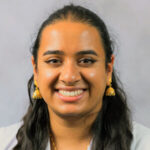 Kavya Anjur, University of Illinois at Chicago, Medicine: Kavya offers wellness classes and a sustainable guidebook for women and their children in domestic violence shelters in Chicago through the Connections for Abused Women and Their Children Program. The classes address healthy physical and mental health practices, positive parenting, and empowerment of personal health, in addition to providing a space to develop social support networks. She will also develop and standardize a wellness curriculum to benefit this community.
Kavya Anjur, University of Illinois at Chicago, Medicine: Kavya offers wellness classes and a sustainable guidebook for women and their children in domestic violence shelters in Chicago through the Connections for Abused Women and Their Children Program. The classes address healthy physical and mental health practices, positive parenting, and empowerment of personal health, in addition to providing a space to develop social support networks. She will also develop and standardize a wellness curriculum to benefit this community.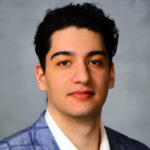 Mohammad Abdallah, University of Illinois at Chicago, Pharmacy: Moe aims to provide telehealth services for smoking cessation to low-income patients, including group and individual counseling sessions, as well as a mail-order medication system. This initiative is designed to reduce barriers to treatment and increase accessibility for patients who cannot attend in-person appointments.
Mohammad Abdallah, University of Illinois at Chicago, Pharmacy: Moe aims to provide telehealth services for smoking cessation to low-income patients, including group and individual counseling sessions, as well as a mail-order medication system. This initiative is designed to reduce barriers to treatment and increase accessibility for patients who cannot attend in-person appointments.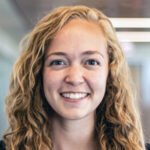 Rachel Bartnett, Loyola University, Medicine: Rachel partners with Maywood Fine Arts to address the ongoing pediatric mental health crisis. She offers consistent mental health programming and wellness education based on the eight pillars of a wellness wheel: physical, social, emotional, intellectual, financial, occupational, environmental, and spiritual wellness. Rachel’s programming will equip school-age students from diverse socioeconomic backgrounds with critical knowledge about mental health and wellness, while planning for sustainability of this initiative.
Rachel Bartnett, Loyola University, Medicine: Rachel partners with Maywood Fine Arts to address the ongoing pediatric mental health crisis. She offers consistent mental health programming and wellness education based on the eight pillars of a wellness wheel: physical, social, emotional, intellectual, financial, occupational, environmental, and spiritual wellness. Rachel’s programming will equip school-age students from diverse socioeconomic backgrounds with critical knowledge about mental health and wellness, while planning for sustainability of this initiative.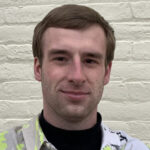 Daniel Benedum, School of the Art Institute of Chicago, Art Therapy and Counseling: The GSA Zine project offers students a space to connect and think about LGBTQ+ curriculum, student experiences, and student relationships to their schools and peers. A 6 week zine making project within Chicago Public Schools allows students to engage in art making and relational discussions around queer theory ideas, current events, alongside creating imaginative stories and characters. The zines will be saved within Chicago Public School GSA clubs to connect with future students, aid in LGBTQ+ curriculum ideas, and give insight to CPS staff about student experiences.
Daniel Benedum, School of the Art Institute of Chicago, Art Therapy and Counseling: The GSA Zine project offers students a space to connect and think about LGBTQ+ curriculum, student experiences, and student relationships to their schools and peers. A 6 week zine making project within Chicago Public Schools allows students to engage in art making and relational discussions around queer theory ideas, current events, alongside creating imaginative stories and characters. The zines will be saved within Chicago Public School GSA clubs to connect with future students, aid in LGBTQ+ curriculum ideas, and give insight to CPS staff about student experiences.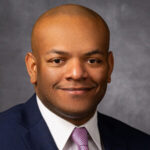 Brian Carter, Northwestern University, Medicine: Brian develops educational modules to train individuals experiencing homelessness, individuals diagnosed with HIV/AIDS, and low-income families to identify legal barriers to accessing quality healthcare services and to articulate those barriers to the Legal Council for Health Justice (LCHJ). Brian, a former practicing attorney, will partner with LCHJ to address identified barriers by assisting with individual cases and drafting proposed legislation aimed at systemic change.
Brian Carter, Northwestern University, Medicine: Brian develops educational modules to train individuals experiencing homelessness, individuals diagnosed with HIV/AIDS, and low-income families to identify legal barriers to accessing quality healthcare services and to articulate those barriers to the Legal Council for Health Justice (LCHJ). Brian, a former practicing attorney, will partner with LCHJ to address identified barriers by assisting with individual cases and drafting proposed legislation aimed at systemic change.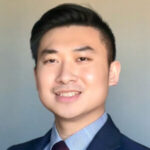 Kevin Chen, University of Chicago, Medicine: Kevin offers educational sessions and activities addressing the increasing burden of musculoskeletal health problems in the older Chinese population living in Bridgeport and Chinatown. By providing culturally sensitive prevention strategies and management options that community members can be comfortable pursuing, Kevin will equip Chinese seniors with the knowledge to protect against age-related decline in physical function and quality of life while also limiting the impact of musculoskeletal-related pain.
Kevin Chen, University of Chicago, Medicine: Kevin offers educational sessions and activities addressing the increasing burden of musculoskeletal health problems in the older Chinese population living in Bridgeport and Chinatown. By providing culturally sensitive prevention strategies and management options that community members can be comfortable pursuing, Kevin will equip Chinese seniors with the knowledge to protect against age-related decline in physical function and quality of life while also limiting the impact of musculoskeletal-related pain.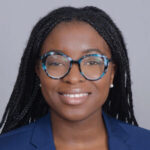 Ateh Fonteh, Northwestern University, Medicine and Public Health: Ateh partners with the Chicago Help Initiative to bolster health education and services for people experiencing homelessness and refugees in Near North Chicago. She offers educational workshops while providing direct health services, combining knowledge and access to facilitate health empowerment in this community.
Ateh Fonteh, Northwestern University, Medicine and Public Health: Ateh partners with the Chicago Help Initiative to bolster health education and services for people experiencing homelessness and refugees in Near North Chicago. She offers educational workshops while providing direct health services, combining knowledge and access to facilitate health empowerment in this community.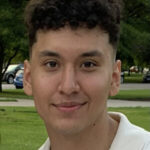 Axel Garcia, Roosevelt University, Pharmacy: Axel partners with Rush University in a community outreach effort to provide the Latino immigrant population of the South/Southwest side of Chicago with education in Spanish on affordable healthcare. His project will equip community members with the tools necessary to manage chronic disease and prevent future illness.
Axel Garcia, Roosevelt University, Pharmacy: Axel partners with Rush University in a community outreach effort to provide the Latino immigrant population of the South/Southwest side of Chicago with education in Spanish on affordable healthcare. His project will equip community members with the tools necessary to manage chronic disease and prevent future illness.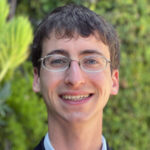 Jesse Gamoran, DePaul University, Clinical and Community Psychology: With guidance from residents and staff at The Boulevard (a Chicago-based medical respite shelter), Jesse facilitates weekly support groups to increase the sense of community among residents and staff members. The project goal is to reduce adverse mental health impacts and increase staff retention.
Jesse Gamoran, DePaul University, Clinical and Community Psychology: With guidance from residents and staff at The Boulevard (a Chicago-based medical respite shelter), Jesse facilitates weekly support groups to increase the sense of community among residents and staff members. The project goal is to reduce adverse mental health impacts and increase staff retention.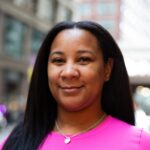 Ivory Griffin, Northeastern Illinois University, Public Health: Ivory leads the Academic Connection Experience (ACE) program, which helps adolescents receiving mental health care at Hartgrove Behavioral Health System address academic and environmental stressors. The program offers interactive health educational group sessions, as well as individual consultations to assist adolescents and their families in managing academic stress, improving well-being, and enhancing family communication for a successful return to school after hospitalization.
Ivory Griffin, Northeastern Illinois University, Public Health: Ivory leads the Academic Connection Experience (ACE) program, which helps adolescents receiving mental health care at Hartgrove Behavioral Health System address academic and environmental stressors. The program offers interactive health educational group sessions, as well as individual consultations to assist adolescents and their families in managing academic stress, improving well-being, and enhancing family communication for a successful return to school after hospitalization.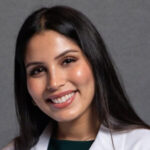 Sayyida Hasan, Rush University, Medicine: Sayyida partners with the Salvation Army’s Freedom Center to improve the musculoskeletal health of women in the Humboldt Park neighborhood. She leads an engaging program that combines educational sessions about MSK health with self-defense-based workout classes to promote physical activity and preventative care. She facilitates a supportive community environment and provides resources to empower women and children and enhance their overall well-being.
Sayyida Hasan, Rush University, Medicine: Sayyida partners with the Salvation Army’s Freedom Center to improve the musculoskeletal health of women in the Humboldt Park neighborhood. She leads an engaging program that combines educational sessions about MSK health with self-defense-based workout classes to promote physical activity and preventative care. She facilitates a supportive community environment and provides resources to empower women and children and enhance their overall well-being.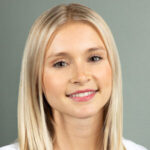 Grace Keegan, University of Chicago, Medicine: Grace implements an emergency preparedness and empowerment program for people affected by or at risk for community violence at Firebird Community Arts. She promotes life-saving skills and healing among youth and people involved in trauma recovery programs by teaching emergency preparedness skills and organizing art therapy and therapeutic conversations that address the burden of community violence.
Grace Keegan, University of Chicago, Medicine: Grace implements an emergency preparedness and empowerment program for people affected by or at risk for community violence at Firebird Community Arts. She promotes life-saving skills and healing among youth and people involved in trauma recovery programs by teaching emergency preparedness skills and organizing art therapy and therapeutic conversations that address the burden of community violence.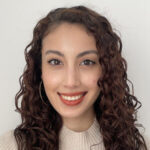 Erika Meraz, Roosevelt University, Biomedical Science: Through collaboration with The Resurrection Project, Erika offers a health literacy program that serves the Latine community. The program provides education on how to seek, obtain, and understand health insurance and health care. The program serves as a tool to further empower individuals with the knowledge to navigate the healthcare system effectively.
Erika Meraz, Roosevelt University, Biomedical Science: Through collaboration with The Resurrection Project, Erika offers a health literacy program that serves the Latine community. The program provides education on how to seek, obtain, and understand health insurance and health care. The program serves as a tool to further empower individuals with the knowledge to navigate the healthcare system effectively.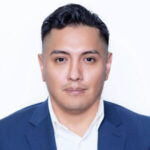 Roberto Mizhquiri, DePaul University, Nursing: In partnership with the Peace Exchange, Roberto facilitates an educational project rooted in the south side of Chicago. The project will focus on violence prevention through educational activities that promote mental wellness.
Roberto Mizhquiri, DePaul University, Nursing: In partnership with the Peace Exchange, Roberto facilitates an educational project rooted in the south side of Chicago. The project will focus on violence prevention through educational activities that promote mental wellness.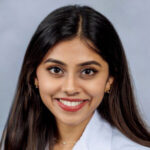 Saranya Menon, University of Illinois at Chicago, Medicine: Saranya partners with Deborah’s Place to explore nutritional psychiatry, aiming to build upon the healthy eating habits of women who have previously faced homelessness. She facilitates cooking classes and nutritional workshops with recipes that enhance the gut-brain axis. She also facilitates mental health programming as part of these workshops to transform negative attitudes toward healthy food and provide tools to sustain healthy eating habits.
Saranya Menon, University of Illinois at Chicago, Medicine: Saranya partners with Deborah’s Place to explore nutritional psychiatry, aiming to build upon the healthy eating habits of women who have previously faced homelessness. She facilitates cooking classes and nutritional workshops with recipes that enhance the gut-brain axis. She also facilitates mental health programming as part of these workshops to transform negative attitudes toward healthy food and provide tools to sustain healthy eating habits.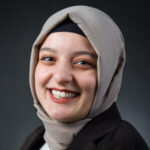 Deniz Namik, University of Illinois at Chicago, Dentistry: Deniz partners with RefugeeOne to decrease oral healthcare disparities among refugee, asylum-seeking, and immigrant populations in the Chicagoland area. She hosts dental education workshops that cover a variety of topics, provides basic dental preventative services, and fosters sustainable initiatives through translated resources that can be used long-term. Through these activities, she aims to empower individuals to take control of their oral health and promote long-term oral health equity.
Deniz Namik, University of Illinois at Chicago, Dentistry: Deniz partners with RefugeeOne to decrease oral healthcare disparities among refugee, asylum-seeking, and immigrant populations in the Chicagoland area. She hosts dental education workshops that cover a variety of topics, provides basic dental preventative services, and fosters sustainable initiatives through translated resources that can be used long-term. Through these activities, she aims to empower individuals to take control of their oral health and promote long-term oral health equity.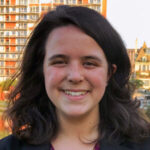 Katie Owens, Northwestern University, Medicine and Public Health: Katie works with the Chicago Help Initiative to bring health education workshops and basic healthcare services to unhoused and refugee peoples in downtown Chicago. Through education and direct services, participants in these workshops are empowered with the knowledge and access essential to leading healthier lives.
Katie Owens, Northwestern University, Medicine and Public Health: Katie works with the Chicago Help Initiative to bring health education workshops and basic healthcare services to unhoused and refugee peoples in downtown Chicago. Through education and direct services, participants in these workshops are empowered with the knowledge and access essential to leading healthier lives.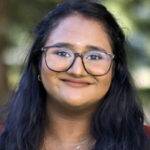 Binita Pandya, Rosalind Franklin University, Medicine: Binita partners with Roberti Community House to increase health agency among youth in Waukegan. She works with the afterschool program to initiate interactive workshops focused on health education and health communication. She also creates resources and infographics that can be disseminated to participant families and community members served by the community organization.
Binita Pandya, Rosalind Franklin University, Medicine: Binita partners with Roberti Community House to increase health agency among youth in Waukegan. She works with the afterschool program to initiate interactive workshops focused on health education and health communication. She also creates resources and infographics that can be disseminated to participant families and community members served by the community organization.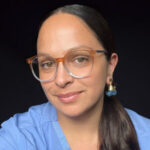 Anjali Pinto, University of Illinois at Chicago, Nursing: Anjali partners with Lawndale Christian Health Center to provide resources, education, and support to perinatal patients living in Chicago’s migrant shelters. In conjunction with social workers, doctors, and nurses, Anjali participates in on-site check-ins with families living in shelters, the production of educational materials that can be utilized in clinics, and facilitating support groups for families expecting infants. Topics covered in these initiatives include maternal mental health, health insurance education, prevention of Sudden Unexpected Infant Death, and nutrition.
Anjali Pinto, University of Illinois at Chicago, Nursing: Anjali partners with Lawndale Christian Health Center to provide resources, education, and support to perinatal patients living in Chicago’s migrant shelters. In conjunction with social workers, doctors, and nurses, Anjali participates in on-site check-ins with families living in shelters, the production of educational materials that can be utilized in clinics, and facilitating support groups for families expecting infants. Topics covered in these initiatives include maternal mental health, health insurance education, prevention of Sudden Unexpected Infant Death, and nutrition.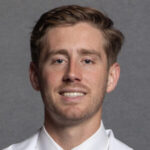 Trevor Poulson, Rush University, Medicine: Trevor’s project goal is to enhance specialty healthcare services for homeless and migrant populations on Chicago’s west side, focusing on expanding access to ophthalmology care through the existing CURE clinic framework. Partnering with Rush Medical Center and Franciscan Outreach Shelter, he aims to provide comprehensive, no-cost services, including ophthalmology, otolaryngology, audiology, and orthopedic care. This initiative is intended to improve health outcomes, ensure regular access to critical healthcare services, and foster trust within these underserved communities.
Trevor Poulson, Rush University, Medicine: Trevor’s project goal is to enhance specialty healthcare services for homeless and migrant populations on Chicago’s west side, focusing on expanding access to ophthalmology care through the existing CURE clinic framework. Partnering with Rush Medical Center and Franciscan Outreach Shelter, he aims to provide comprehensive, no-cost services, including ophthalmology, otolaryngology, audiology, and orthopedic care. This initiative is intended to improve health outcomes, ensure regular access to critical healthcare services, and foster trust within these underserved communities.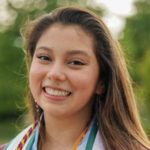 Sara Ruiz, Loyola University, Public Health: Sara partners with Erie Family Health Centers to increase awareness and prevention of intimate partner violence (IPV). She directs and implements support groups, workshops, and activities among various Erie patient groups to initiate dialogue on the identification of healthy and unhealthy behaviors in relationships. She hopes to inspire and empower IPV survivors to regain control and confidence in their lives.
Sara Ruiz, Loyola University, Public Health: Sara partners with Erie Family Health Centers to increase awareness and prevention of intimate partner violence (IPV). She directs and implements support groups, workshops, and activities among various Erie patient groups to initiate dialogue on the identification of healthy and unhealthy behaviors in relationships. She hopes to inspire and empower IPV survivors to regain control and confidence in their lives.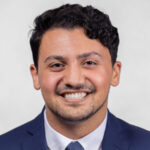 Hussein Salem, University of Illinois at Chicago, Dentistry: Hussein implements his project at the Yemeni American Community Center, Aden Center, by conducting dental education workshops for the community’s children, women, and men. These interactive sessions include crucial aspects like health literacy, proper dental care practices, oral hygiene, and mental health. They also offer valuable nutrition advice to promote overall oral and general health within the Yemeni community.
Hussein Salem, University of Illinois at Chicago, Dentistry: Hussein implements his project at the Yemeni American Community Center, Aden Center, by conducting dental education workshops for the community’s children, women, and men. These interactive sessions include crucial aspects like health literacy, proper dental care practices, oral hygiene, and mental health. They also offer valuable nutrition advice to promote overall oral and general health within the Yemeni community.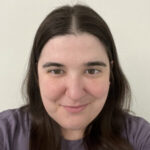 Nicole Safran, Rush University, Nursing: Nicole provides health and wellness programming for people impacted by incarceration and empowers participants to cultivate healthy relationships with themselves, their families, friends, and communities.
Nicole Safran, Rush University, Nursing: Nicole provides health and wellness programming for people impacted by incarceration and empowers participants to cultivate healthy relationships with themselves, their families, friends, and communities.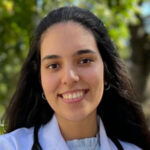 Ismihan Uddin, Midwestern University, Medicine: Ismihan addresses the healthcare disparities prevalent among immigrants, refugees, and asylum seekers in the Chicagoland area by prioritizing educational initiatives and facilitating access to proper healthcare.
Ismihan Uddin, Midwestern University, Medicine: Ismihan addresses the healthcare disparities prevalent among immigrants, refugees, and asylum seekers in the Chicagoland area by prioritizing educational initiatives and facilitating access to proper healthcare.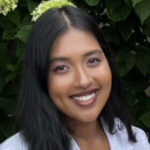 Suvitha Viswanathan, Loyola University, Medicine: In collaboration with Gilda’s Club and the Loyola Medicine Cardinal Bernardin Cancer Center, Suvitha offers patient-centered educational resources and workshops on sexual health for female-identifying people living with cancer. She works to address the unique sexual health-related survivorship needs that patients face throughout their cancer journey.
Suvitha Viswanathan, Loyola University, Medicine: In collaboration with Gilda’s Club and the Loyola Medicine Cardinal Bernardin Cancer Center, Suvitha offers patient-centered educational resources and workshops on sexual health for female-identifying people living with cancer. She works to address the unique sexual health-related survivorship needs that patients face throughout their cancer journey.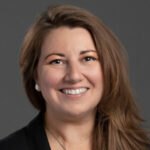 Nicole Walkowiak, Rush University, Nursing: Nicole provides wound care education to people with intravenous drug injection wounds. She works closely with staff and volunteers of The Night Ministry on outreach teams to enhance their knowledge of wound care and help them identify when to direct patrons to seek medical treatment. The education she offers focuses on harm reduction, wound infection reduction, and sepsis prevention.
Nicole Walkowiak, Rush University, Nursing: Nicole provides wound care education to people with intravenous drug injection wounds. She works closely with staff and volunteers of The Night Ministry on outreach teams to enhance their knowledge of wound care and help them identify when to direct patrons to seek medical treatment. The education she offers focuses on harm reduction, wound infection reduction, and sepsis prevention.2023–2024 Fellows
Hana Ahmed, University of Illinois at Chicago, Medicine: Hana Ahmed is interested in women’s health and medicine for those who are incarcerated. She will be working at the Cook County Jail to deliver a course structured around narrative therapy and storytelling to empower women to take ownership of their stories.
Ruth Londono Alzate, Rosalind Franklin University, Medicine: Ruth proposes to initiate a healthy lifestyle and empowerment program for at-risk youth that come from financial struggles. The program will provide educational seminars and leadership courses to youth. This program will empower these youth to believe in themselves and positively impact their community.
Karyn Byrne, National Louis University, Community Psychology: Karyn is passionate about establishing safe, accessible spaces where community members can receive social support regarding weight wellness. The weekly meetings to be offered will provide education on topics chosen by community members and social support to promote healing and a sense of community.
Ivana Chmielewski, North Park University, Nursing and Business: Through collaboration with Swedish Hospital, Ivana will develop literacy education with a focus on mental health and social determinants of health to provide transcultural nursing resources that empower the community of immigrants, refugees, minority, and unhoused individuals in a safe community space.
Sydney Cush, Northwestern University, Medicine: By working with community health clinics, Sydney hopes to develop culturally relevant educational materials and a curriculum that will educate black women on reproductive health topics such as endometriosis and self-advocacy in the doctor’s office.
Inés Debbiche, Northwestern University, Medicine: Inés proposes to educate Hispanic patients at the Community Health Clinic to increase health literacy and improve hypertension management.
Celeste Guzman, University of Illinois, Pharmacy: Celeste proposes to initiate mental health workshops for the underserved communities of Chicago. Workshops will empower community members to address mental health concerns in their daily lives and continue developing resilience.
Kai Holder, Northwestern University, Medicine and Public Health: Kai’s project is a Parent Readiness Psycho-Education Program that hosts educational seminars focused on self-agency and empowerment for young pregnant and postpartum women.
Chinasa Imo, University of Chicago, Social and Health Policy: Chinasa is interested in reducing disparities in access to care for women and youths facing domestic abuse/violence in Chicago. Her Project will create a safe space support program where women and youths facing violent abuse can receive tailored, wrap-around support to help them overcome their vulnerabilities.
Julia Kavanagh, Midwestern University, Medicine: Julia will partner with the LYDIA Home to address the poor health outcomes of children in the foster care system. Through education activities and self-empowerment, this project will work to combat early health disadvantages and improve the health literacy of Chicago’s foster care youth.
Tyler Linder, Rush University, Medicine: Tyler is facilitating a community educational program through Rush University and Project sWish Chicago for underserved youth affected by gang violence. Project sWish hosts basketball tournaments during times of high gang violence and by working together this program will educate children about mental/physical health and provide information regarding health care.
Jacqueline Lueken, Loyola University Chicago, Social Work: Jacque proposes to facilitate support groups for Caregivers and Supporters of loved ones who have been diagnosed with a chronic illness or disease using arts integration. These groups will provide a space for those who are often the last to ask for help or support a space to make connections, share their hardships and experiences, and find a much needed reprieve from being the “one leaned on” in order to help them continue to be there fully for their loved ones.
Paige Madden, Midwestern University, Dentistry and Public Health: Paige’s proposed project involves making sure that senior citizens in our community benefit from the preventative measures of health.
Sahar Al-Najjar, Adler University, Clinical Psychology: Sahar values advocating for diverse communities and uplifting the narratives and lived experiences of marginalized identities who have often been underrepresented. Sahar proposes to initiate a therapy support group for BIPOC individuals from marginalized backgrounds who seek trauma-informed mental health support. The therapy group will serve as a social support for individuals who do not have equitable mental health resources within their community.
Angela Olivar, University of Illinois Chicago, Dentistry: Angela proposes to raise awareness about the importance of oral healthcare, providing educational sessions and to address factors that limit Latino communities in seeking continuous oral healthcare services.
Simon Park, Loyola University, Medicine: Simon will lead a self-advocacy medical training program for blind and visually impaired (BVI) residents at the Friedman Place in Northwest side of Chicago. This effort will equip BVI adults with knowledge in basic medical terms and communication skills to advocate for improved health and wellness.
Evan Patel, Rush University, Medicine: Evan plans to improve the accessibility of otolaryngology care for Chicago’s homeless population through the development of free in-person and telemedicine clinics. These clinics are a small but important step in dismantling preexisting barriers that homeless populations face in receiving quality healthcare.
Fatima Rasoul, Loyola University, Social Work: Fatima proposes to develop a program to provide social supports for refugee and immigrant mothers. Her program foci are maternal education and mental health support to promote maternal and child health, as well as providing support to diminish the bureaucratic barriers preventing access to social welfare programs.
Ambika Seshadri, DePaul University, Nursing: Ambika proposes to establish or expand prenatal support programming at a clinic on the South Side of Chicago that serves African American women. The program curriculum will provide health screening, education to promote health literacy and self-advocacy, and social support.
Chirag Shah, Midwestern University, Medicine: Chirag proposes a medical literacy program that serves non-English speaking Spanish residents. The program will provide information on accessing healthcare and understanding individual health.
Michelle Soans, DePaul University, Research Psychology: Michelle proposes to implement resilience building workshops at Cook County Jail’s Women’s Division. The workshops will provide women with practice based coping strategies, mental health education and resources, as well as career development tools, to promote mental wellness and empowerment.
Alexander Wang, University of Chicago, Medicine: Alex plans to work with the Coalition for a Better Chinese American Community to sustain and expand upon the Origin Youth Program, a youth-led program that empowers high school students to develop and carry out civic engagement projects of their choosing. This project will support students in the Origin Youth Program as they develop their sense of identity.
Jason Xiao, University of Chicago, Medicine: Jason’s project centers on raising awareness on health disparities in visual health, organizing low-cost vision screenings and referrals. He will develop an educational curriculum for members of the Bridgeport/Chinatown communities to be better equipped to take charge of their visual and systemic health.
Karen Yuan, Loyola University, Medicine: Karen will partner with the Center on Halsted to address the unique aging challenges and caregiving needs of LGBTQ+ older adults. She will implement healthy aging initiatives that increase visibility in LGBTQ+ aging, foster intergenerational connection, and connect seniors and their caregivers with community assets so that more LGBTQ+ older adults will have the support and resources to live life to the fullest.
Fellows for Life
With its collaborative and interprofessional nature, the Schweitzer Fellowship was an instrumental opportunity to build a network of driven, like-minded individuals. All in all, I hope to utilize the connections made through the Schweitzer Fellowship for the rest of my career.
–Christianah Ogunleye, 2018–19 Chicago Area Schweitzer Fellow
Since 2006, the Chicago Area Schweitzer Fellows Program has provided programming for our Fellows for Life, alumni of the Albert Schweitzer Fellowship living in the Chicago area. The Chicago Fellows for Life program aims to further engage alumni in Albert Schweitzer’s ideals and provide opportunities for networking between alumni, community engagement, leadership, professional development, and a sense of camaraderie amongst a group of like-minded individuals.
Fellows for Life Seed Grants
For the past several years, the Chicago Area Schweitzer Fellows Program has been able to offer seed grants to Fellows for Life interested in beginning, sustaining, or building on innovative community projects that help underserved Chicago communities.
The application period for Seed Grants is now closed and reopens in March 2025.
Current Seed Grant Projects
Carol Blendowski, 2003-04 Fellow for Life, will work with the compassionate volunteers of the Care for Friends Foot Clinic, who serve the most disenfranchised fragment of our population, providing basic healthcare, comfort, and social support.
Dr. Ashok Jagasia, 1998-99 Fellow for Life, Evan Patel, 2023-24 Fellow for Life, and Trevor Poulson, a current Fellow, will work in collaboration with local homeless shelters to provide the homeless and migrant residents of Chicago with high-quality, comprehensive otolaryngology care via a multimodal clinical approach.
Zhong Huang, 2022-23 Fellow for Life, will work with the Supporting Healthy Aging Resources & Education (SHARE) Network and community partners to develop an advance care planning program for aging individuals, individuals living with serious illness, and minority communities.
Named Fellowships
Overview
For 25 years, the Chicago Area Schweitzer Fellows Program has provided a platform for graduate students to design and implement innovative projects that improve the health and well-being of underserved populations throughout Chicago. In collaboration with existing Chicagoland organizations, fellows use a broad public health lens to improve well-being and target the social determinants of health.
Looking for a meaningful way to support the next generation of aspiring health professionals? Consider sponsoring a Named Fellowship at the Health & Medicine’s Chicago Area Schweitzer Fellows Program. For more information, please reach out to Shannon Sweetnam, Director of Development and Communications at ssweetnam@hmprg.org.
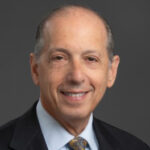 The Larry J. Goodman, MD Fellowship aims to provide mentorship and support to individuals dedicated to making a difference in health equity in disinvested Chicago communities. Funded by David Ansell, MD, Senior Vice President for Community Health Equity at Rush University Medical Center, this fellowship honors Dr. Goodman’s remarkable contributions to healthcare, his passion for mentoring, and his enduring commitment to addressing health disparities, particularly on the West side of Chicago.
The Larry J. Goodman, MD Fellowship aims to provide mentorship and support to individuals dedicated to making a difference in health equity in disinvested Chicago communities. Funded by David Ansell, MD, Senior Vice President for Community Health Equity at Rush University Medical Center, this fellowship honors Dr. Goodman’s remarkable contributions to healthcare, his passion for mentoring, and his enduring commitment to addressing health disparities, particularly on the West side of Chicago.
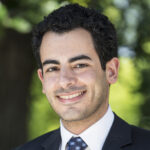 The Tarik F. Ibrahim MD, MS Fellowship recognizes and honors the life and legacy of Tarik F. Ibrahim by naming an outstanding Fellow working with underserved populations. This honors Dr. Ibrahim’s calling of ensuring the health and well-being of underserved populations and his passion for service and charity within the field of medicine.
The Tarik F. Ibrahim MD, MS Fellowship recognizes and honors the life and legacy of Tarik F. Ibrahim by naming an outstanding Fellow working with underserved populations. This honors Dr. Ibrahim’s calling of ensuring the health and well-being of underserved populations and his passion for service and charity within the field of medicine.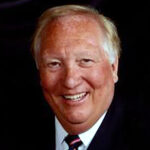 Named in honor of Frank Indihar, MD—whose grandniece, Kelly Moore (née Koronkowski), was a 2020-2021 Chicago Area Schweitzer Fellow—the Frank J. Indihar, MD Fellowship was established to provide mentorship and support for those looking to make a difference in underserved Chicago communities, particularly in the fields of nursing, pharmacy, and medicine, and to honor Dr. Indihar’s work as a physician, philanthropist, and lifelong mentor to aspiring medical professionals.
Named in honor of Frank Indihar, MD—whose grandniece, Kelly Moore (née Koronkowski), was a 2020-2021 Chicago Area Schweitzer Fellow—the Frank J. Indihar, MD Fellowship was established to provide mentorship and support for those looking to make a difference in underserved Chicago communities, particularly in the fields of nursing, pharmacy, and medicine, and to honor Dr. Indihar’s work as a physician, philanthropist, and lifelong mentor to aspiring medical professionals.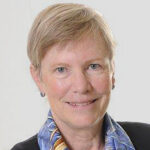 Named by her family and friends, the Leslie Nickels MEd, PhD Fellowship honors the rich legacy of service, mentorship, and leadership of Leslie Nickels, MEd, PhD. Dr. Nickels championed the important role of government in worker health and safety, the need to empower workers, and working with the practice community.
Named by her family and friends, the Leslie Nickels MEd, PhD Fellowship honors the rich legacy of service, mentorship, and leadership of Leslie Nickels, MEd, PhD. Dr. Nickels championed the important role of government in worker health and safety, the need to empower workers, and working with the practice community.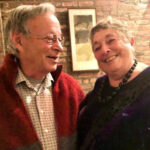 The Bob and Caryle Perlman Fellowship was established to provide mentorship and support to those looking to make a difference in underserved Chicago communities. Wishing they had access to a program like the Schweitzer Fellowship early on in their own careers, Bob and Caryle feel it’s important to give back now to the next generation of service-minded health and human service professionals.
The Bob and Caryle Perlman Fellowship was established to provide mentorship and support to those looking to make a difference in underserved Chicago communities. Wishing they had access to a program like the Schweitzer Fellowship early on in their own careers, Bob and Caryle feel it’s important to give back now to the next generation of service-minded health and human service professionals.Learn more
About Larry J. Goodman, MD
Larry Goodman served as both CEO of Rush University Medical Center and President of Rush University from February 2002 until mid-2019. Additionally, Dr. Goodman was the first CEO of the Rush University System for Health, serving from 2017 to May 2019. He holds the academic rank of professor of Internal Medicine and is the University’s emeritus James A. Campbell, MD, Distinguished Service Endowed Professor.
During his tenure, Rush became nationally recognized for excellence in patient care, breakthrough research, and the quality of its educational programs. Dr. Goodman also led innovative community partnerships to reduce inequities and returned Rush to a position of solid financial strength. “I established the Larry J. Goodman, MD Fellowship to honor a remarkable leader and mentor whose contributions have profoundly impacted healthcare,” says Ansell. “My hope is that this fellowship will inspire and support the next generation of healthcare professionals dedicated to serving underserved communities and advancing health equity. Together, we can continue Dr. Goodman’s legacy of excellence and compassion in medicine.”
2024–25 Larry J. Goodman, MD Fellow
Sayyida Hasan, Rush University, Medicine
Sayyida plans to deliver seminars and workshops on musculoskeletal health for people at risk for violence. These sessions will provide education and serve as a support structure for long-term musculoskeletal health outcomes.
About Tarik F. Ibrahim, MD, MS
Each year, Health & Medicine Policy Research Group recognizes the life and legacy of Tarik Ibrahim by naming an outstanding Fellow working with underserved populations the Tarik F. Ibrahim MD, MS Schweitzer Fellow. This honors Dr. Ibrahim’s calling of ensuring the health and well-being of underserved populations and his passion for service and charity within the field of medicine. It was created by a Fellow for Life who was deeply inspired by Dr. Ibrahim’s life:
“The legacy that I want to share about Tarik Ibrahim is that he was the most selfless person I’ve ever met. His character and accomplishments were undoubtedly a reflection of the love and support he received throughout his life from his parents. He was so giving of himself to others in every aspect of his life. Treating his friends and family with love, care and compassion were instinctive to him, as it was to treat strangers like friends, as it was to offer himself in the little free time he had to be of service to others and help mentor medical students and younger residents. He never once complained about the hours he worked or how little time he had to himself. He truly enjoyed being a doctor and caring for the sick. It was his calling. It brought him joy and filled him with life.”
Tarik F. Ibrahim was born on September 2, 1981, in Grosse Pointe Shores, Michigan. He graduated from Penn State College of Medicine in 2010 and completed a neurosurgical residency at Loyola University Medical Center. Dr. Ibrahim’s academic achievements include 39 publications and presentations, with first authorship on several. Notably, he found a treatable cause—now known as the Tarik Syndrome—when one of his patients developed what was thought to be permanent blindness following spinal surgery.
Loyola University Vice Chairman of Neurological Surgery Dr. Russ P. Nockles reflected on Dr. Ibrahim’s discovery as “sight saving scholarly work …it will always stand as a testament to Tarik’s astonishing passion for helping patients when all else had presumably failed.” Because of his accomplishments, Dr. Ibrahim was accepted to the prestigious skull base and cranial nerve surgery fellowship at the Swedish Medical Center in Seattle, Washington. Everyone who met him remembers his warm smile, caring heart, and affectionate demeanor.
Tarik Syndrome
Thanks to Dr. Ibrahim’s dedicated research, occipital lobe seizures and status epilepticus amauroticus (SEA) should now be considered as a possible cause of postoperative vision loss. If SEA is with aggressive antiseizure treatment, permanent vision loss may be prevented. This scientific breakthrough is now aptly named Tarik Syndrome.
Learn more about the Tarik F. Ibrahim MD, MS Fellowship here.
2024-25 Tarik F. Ibrahim MD, MS Fellow
Grace Keegan, University of Chicago, Medicine
In partnership with Firebird Community Arts, Grace plans to implement an emergency preparedness and empowerment program for people affected by community violence. Grace will teach life-saving skills (STOP THE BLEED®) to those in trauma recovery programs and organize an art wall for expressions on the burden of community violence.
Sources:
• Ibrahim TF, Sweis RT, Nockels RP. Reversible Postoperative Blindness caused by Bilateral Status Epilepticus Amauroticus Following Thoracolumbar Deformity Correction: Case Report, Journal of Neurosurgery, 2017 April, 1-5.
• Ziegler A, Spencer D, Nockles RP, Leonetti, J, Ibrahim TF. Tarik Syndrome: Reversible Postoperative Blindness Secondary to Occipital Seizures. World Neurosurgery, (2019) 131:58-61.) https://doi.org/10.1016/j. wneu.2019.07.186
• Ziegler A, Spencer D, Nockels R, Ibrahim T, Leonetti J. Reversible Postoperative Blindness Secondary to Occipital Seizures: Tarik Syndrome. American Academy of Otolaryngology-Head and Neck Surgery annual meeting AAO-H&N. September 2019: New Orleans, LA (Poster).
About Frank J. Indihar, MD
The Fellowship—named in honor of Frank Indihar, MD, whose grandniece, Kelly Moore (née Koronkowski), was a 2020-2021 Chicago Area Schweitzer Fellow—was established to provide mentorship and support for those looking to make a difference in underserved Chicago communities, particularly in the fields of nursing, pharmacy, and medicine.
Kelly’s parents, Karen and Michael Koronkowski, initiated the Fellowship as donor advisees of Dr. Indihar’s charitable fund with the St. Paul Foundation.
“The Schweitzer program is in direct alignment with Uncle Frank’s dynamic commitment to mentoring future leaders, and it has been inspiring to see how Kelly’s experience as a fellow has cultivated her passion for service and for sharing the voice of vulnerable populations,” Karen shares.
During her time as a Fellow, Kelly Moore (who completed her MSN degree at the University of Illinois Chicago) connected with isolated older adults through Little Brothers–Friends of the Elderly (LBFE) and explored their health concerns. Specifically, she engaged in Advanced Care Planning conversations to help older adults make their most important end-of-life wishes known.
After completing her own Schweitzer Fellowship year, Kelly continued with the program, serving as a Peer Mentor to the next cohort of Fellows. Working with a group of six Fellows, she guided their progress through the year with her characteristic ingenuity, commitment and passion for improving the lives of others. She was recognized with an award for her contributions to the 2022-2023 cohort because of her responsiveness, her practical ideas for solving problems, and her support of their Fellowship experiences.
Longtime residents of the Chicago area, Karen and Michael Koronkowski are also health care professionals. Karen is a registered nurse, board certified in hospice and palliative care. Michael is the Director of Interprofessional Education and Collaborative Practice at UIC, and a clinical assistant professor of pharmacy, board certified in geriatrics.
“We are thrilled to support graduate students who share our passion for equitable community health led by the principle that health care is a right rather than a privilege. We also value that the Schweitzer program fosters collaboration across disciplines, for which we are strong advocates,” the Koronkowskis share. “We’re excited to launch the Frank J. Indihar, MD Fellowship this spring, supporting two Fellows in nursing, pharmacy, and/or medicine, and we look forward to following their community projects throughout the Fellowship.”
Born in Gilbert, Minnesota, Frank was salutatorian of Gilbert High School, graduated from the University of Minnesota Medical School in 1973, and completed an MBA from California Coastal University in 1996. He spent many years with St. Paul Internists while also serving at Bethesda Hospital, and he completed his professional career as CEO of Bethesda Hospital and a VP of HealthEast Care System. He interrupted his medical studies to become a Major in the US Army Medical Corps and served both in Vietnam and Washington D.C. He received a Bronze Star with Oak Leaf Cluster in 1970 and was honorably discharged in 1971. He was very active in both civic and medical circles and served on the boards of the St. Paul Seminary, the Minnesota Orchestra, and Catholic Services to the Elderly, among others. He was President of the Ramsey County Medical Society, chaired the Minnesota delegation to the American Medical Association House of Delegates, published many articles on respiratory care, and was recognized as a Luminary by Metro Doctors in 2015. A true Renaissance man, Frank’s warm, affable, and charming personality endeared him to many: he welcomed strangers, built deep, long-lasting friendships, and mentored many young people.
According to the Koronkowskis, Frank was not only dedicated to his work as a physician but also delighted in mentoring prospective medical students and developing lasting friendships with them. Frank would have been proud of Kelly’s work as a Schweitzer Fellow and as a peer mentor for the program, and of the lifelong commitment to service the Fellowship nurtures.
2024-25 Frank J. Indihar, MD Fellows
Nicole Walkowiak, Rush University, Nursing
Nicole plans to provide wound care education to people with intravenous drug injection wounds. She will work closely with staff and volunteers on outreach teams to enhance their knowledge of wound care, and help them in identifying when to direct a patron to seek medical treatment. The education she offers focuses on harm reduction, reducing wound infection, and preventing sepsis.
About Leslie Nickels MEd, PhD
Named by her family and friends, this Fellowship honors the rich legacy of service, mentorship, and scholarship of Leslie Nickels, MEd, PhD. Dr. Nickels’ career began as an audiologist, but she soon found her way to public health studying industrial hygiene at the University of Illinois at Chicago. The seeds of her career were sown in the early 1970’s when she saw a film about the building of the Gateway Arch in St. Louis. She was horrified when the film’s narrator indicated the project’s budget anticipated nine workers would die during building. Although none did, the expectation of worker deaths associated with a monument construction was inconceivable to her and pivotal to her career path.
Dr. Nickels championed the important role of government in worker health and safety protection, the need to empower workers, and working with the practice community. Her distinguished career spanned four decades and included roles at the UIC School of Public Health, Chicago Department of Public Health, National Institute for Occupational Safety and Health, the Centers for Disease Control and Prevention, Illinois Department of Labor, World Health Organization, International Labour Organization, and South Africa National Institute for Occupational Health. She was a beloved professor, mentor, as well as a great friend and former board member of Health & Medicine Policy Research Group.
2024-25 Leslie Nickels, MEd, PhD Fellow
Sara Ruiz, Loyola University, Public Health
Sara plans to increase awareness and prevention of intimate partner violence (IPV) for patients at Erie Family Health Center, a federally qualified health center. She will implement a clinical screening questionnaire to initiate dialogue about IPV among patients and providers, and lead educational sessions and support groups for people who have survived IPV.
About Bob and Caryle Perlman
The Bob and Caryle Perlman Fellowship was established to provide mentorship and support for those looking to make a difference in underserved Chicago communities. Wishing they’d had access to a program like the Schweitzer Fellowship early on in their own careers, Bob and Caryle feel it’s important to give back now to the next generation of service-minded health and human service professionals. According to the Perlmans, Schweitzer Fellows bring hope and a sense of agency to people who would otherwise feel helpless. In recent years, they have been cheered by the Fellows’ enthusiasm, energy, and commitment to service, and believe that these Fellows and their peers are our hope for the future.
Bob and Caryle met as undergraduates at the University of Chicago, where Bob also earned his M.D. and his Ph.D. in biochemistry before moving to New York. Bob accepted a residency in pediatrics at Bellevue Hospital because it was a busy city hospital that provided medical care to underserved populations in New York City. Caryle earned her master’s degree in social work from the Columbia University School of Social Work before choosing field work placements serving disadvantaged and marginalized populations. Two years later, during the Vietnam War, Bob fulfilled his military obligations as a commissioned officer in the Public Health Service, conducting research at the National Institutes of Health. At the same time, Caryle worked for the National Institute of Mental Health in a research and demonstration project to develop community mental health centers.
After these experiences, their professional careers went along more traditional lines. Bob continued in the academic world, teaching and conducting biomedical research, and has been especially interested in the new field of evolutionary medicine, which helps us understand the ways in which our evolutionary heritage has left us vulnerable to disease. Caryle is a supervising and training analyst at the Chicago Psychoanalytic Institute and has been working to bring psychoanalytic education and practice to China.
2024-25 Bob and Caryle Perlman Fellow
Ateh Fonteh, Northwestern University, Medicine and Public Health
Ateh will partner with Schweitzer Fellow Katie Owens in performing a medical needs assessment and aims to use the results to initiate workshops about topics including chronic diseases, nutrition, and exercise. The workshops focus on increasing health literacy and improving health outcomes for people experiencing homelessness and migrants in Downtown Chicago.
Application Process
Applications for 2025–26 Fellows are now closed.
Program Elements and Requirements: Working in collaboration with an existing local community agency, each Fellow designs and implements a service project that addresses an unmet community health need. Fellowship projects include the following:
- A minimum of 200 hours of service (including 130 hours conducting a community service project that is focused on direct, face-to-face contact with the population being served)
- Guidance from mentors, including a Site Mentor at the hosting community agency, an Academic Mentor at the student’s academic institution, and Program mentors
- Monthly progress reports on the Fellow’s project
- Monthly evening meetings in the Chicago Loop
- A written report at the conclusion of the project, including recommendations for ways in which the most valuable aspects of the Fellow’s project and experiences can be replicated or sustained
The Fellowship is an opportunity to be part of an interdisciplinary group of students committed to working in divested communities. In addition to the individual service projects, Fellows work in interdisciplinary learning collaborative groups, expanding their knowledge and capacities. Fellows are required to attend a weekend orientation, a mid-year retreat, monthly meetings, service days, and the annual celebration event at the conclusion of the program year. Fellows receive a stipend of $2,750 (paid in four installments).
Eligibility: Any student who will be enrolled at least part-time in a health-related, graduate-level-degree-granting program during the Fellowship year is welcome to apply. Please note that two exceptions to this are medical and podiatry students who will be entering their third year of medical school. Medical and podiatry students who will be in their first, second, or fourth year during the Fellowship year are eligible.
Prior to Applying: Prospective Fellows should be prepared to partner with an existing community agency to design and implement a community service project that provides a direct service to a divested population. Interested students should investigate and reflect on the strengths and assets of the community they hope to partner with, and the unmet health-related needs that exist in Chicago and its surrounding communities. Applicants might reflect on ways their own energies and talents might contribute to change. In proposing a project, applications should keep in mind how their idea leverages the community’s strengths, addresses unmet health needs, and might be of enduring value to the community.
Application Guidelines: Applicants should be creative in developing their applications. They may choose to develop an original project proposal or propose the continuation of a project initiated by a previous Schweitzer Fellow. Keep in mind that research, administrative, fundraising, and policy-based projects are not considered eligible projects. Applicants may find inspiration in reviewing past Chicago Area Schweitzer Projects and partnering agencies. A Community Site Guide of over 150 Chicago-area community-based organizations that would welcome a Fellow is available upon request.
For more information, please refer to the 2025-2026 Application Rubric used to review all Fellowship applications.
Want to learn more? This video produced by UIC College of Dentistry lays out the Fellowship and introduces you to two of our Program alumni. We’re also pleased to share an info session recording that provides an overview of the Fellowship and application process.
For further information, please contact Karol Dean, Program Director, at kdean@hmprg.org, 312 372-4292 ext. 31.
Advisory Council
Schweitzer Advisory Council
- Founding Chair: Quentin D. Young, MD
- Advisory Council Chair: Ray Mendez, MD, MA, MiMedico, Founding Physician; Board of Directors, Health & Medicine; Physician, Emergency Physicians Medical Group; Faculty, Northwestern Feinberg School of Medicine
Council Members
- Karen Aguirre, MPH, Organizational Social Responsibility, American Medical Association
- David Ansell, MD, MP: Senior Vice President & Associate Provost for Community Health Equity, Rush University
- Claudia Baier, MPH: Retired, VNA Foundation
- François Blumenfeld-Kouchner, MA, PhD, DO: Palliative Physician for WI Central Region, Advocate Aurora Health
- Raymond Curry, MD: Senior Associate Dean for Educational Affairs, University of Illinois at Chicago College of Medicine
- Misty G. Drake, AM: Chief Operating Officer, Medical Home Network
- Sue Etminan: DMD, MPH, Dental Director, Miles Square Health Center
- Bonnie Ewald, MA: Associate Director, Center for Health and Social Care Integration Program Manager, Strategic Development and Policy, Social Work and Community Health, Rush University Medical Center
- Deborah Gaebler-Spira, MD: Attending Physician, Shirley Ryan AbilityLab
- Eva Hernandez-Thomas, MSN: Behavioral Health Community Researcher, Healthcare Alternative Systems
- Rohan D. Jeremiah, PhD, MPH: Assistant Professor of Community Health Sciences, University of Illinois School of Public Health
- Kohar Jones, MD: Family Physician, Heartland Alliance Health
- Sarah Kasprowicz, MD: Medical Dermatologist, Medical Dermatology Associates of Chicago
- Diane M. Kondratowicz, PhD: Unit Adjunct Faculty & Co-Instructional Coordinator, Elgin Community College
- Edwin K. McDonald IV, MD: Assistant Professor of Medicine & Associate Director of Adult Clinical Nutrition, Pritzker School of Medicine, University of Chicago
- Robert McKersie, MD, Family Medicine Physician, Greater Lawrence Family Health Center
- Rajesh Parikh, MD, MPH, Retired, Illinois Primary Healthcare Association
- Lisa Rosenberg, PhD, RN, Retired, Rush University College of Nursing
- Steven Rothschild, MD, Professor and Chair, Department of Family Medicine, Rush University Medical Center
- Abigail Sivan, PhD, Research Associate Professor, Northwestern University Feinberg School of Medicine
- Patrick D. Smith, DMD, MPH, Clinical Assistant Professor, University of Illinois College of Dentistry
- Shirley Stephenson, FNP-BC, Investigator and Medical Clinician, University of Illinois College of Nursing
- Harvey Wigdor, DDS, MS, Professor, University of Illinois College of Dentistry
- Sandra P. Wilks, RN, MSN, CNE, Director of Women’s Health, Illinois Breast and Cervical Cancer Program, Michael Reese Research and Education Foundation
- Aging Equity Center
- Chicago Area Health Education Center
- Chicago Area Schweitzer Fellowship Program
- Equity Intern Program
- Freestanding Birth Centers
- Forums for Justice in Health Policy
- Health Care Safety Net Center
- Health Sector Workforce Initiatives
- Illinois ACEs Response Collaborative
- Public Health Equity Center
